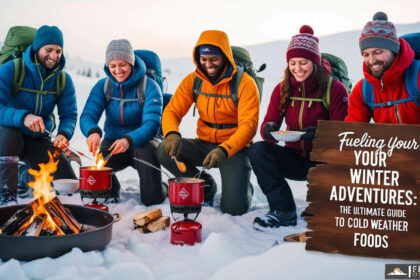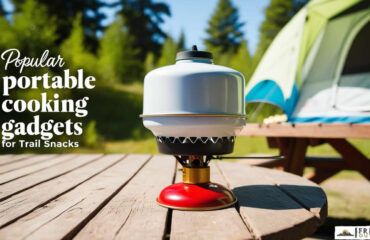
Some of the top foods that will keep you energized and warm during your cold weather adventures.
Understanding the Importance of Nutrition in Cold Weather Activities
Engaging in outdoor adventures during cold weather significantly increases our caloric needs, often requiring an additional 2,000 to 3,000 calories daily. In extreme conditions, survival needs may even reach up to 5,000 calories per day. This surge in energy requirements is primarily due to the body’s efforts to maintain a stable core temperature while facing the chilling elements. Proper nutrition is essential for sustaining energy levels and keeping body warmth during outdoor winter escapades, and understanding this need can enhance your overall experience and safety.
For instance, military personnel stationed in frigid environments often require around 4,500 calories per day to prevent weight loss and enhance performance. This requirement highlights how the body works overtime to combat the cold. If you’re planning a winter camping trip, consider how your body will react to the cold and prepare your food choices accordingly. Ensuring you have enough high-energy foods on hand will not only keep your spirits up, but it will also be crucial for endurance as you tackle various outdoor activities.
In addition, it’s important to recognize that the type of activities you engage in will influence your nutritional needs. For example, hiking or skiing requires sustained energy, whereas activities like ice fishing may require less energy overall. Thus, planning your meals and snacks based on your activities can help optimize your performance and enjoyment during your cold weather adventures.
Importance of Nutrition in Cold Weather
In cold environments, our bodies burn more calories to keep warm, making it crucial to maintain an adequate intake of calories. A balanced diet rich in carbohydrates, fats, and proteins is essential for sustaining energy during outdoor activities. High-fat foods, in particular, are beneficial for thermoregulation, as seen in the traditional diets of indigenous peoples who often consume higher fat contents to combat the cold. This dietary choice allows them to thrive in harsh conditions, providing a poignant example of how nutrition can directly impact performance and survival.
An excellent addition to your winter diet could be foods like nuts and avocados, which are high in healthy fats and provide lasting energy. For instance, packing a mix of trail mix that includes walnuts, almonds, and dried fruits can offer a perfect snack that not only boosts your energy levels but also provides essential nutrients. This balance ensures that you remain fueled during your adventures, allowing you to enjoy the beauty of winter without feeling drained.
Moreover, it’s important to remember that your body may also require more hydration in cold weather, which can sometimes be overlooked. Dehydration can lead to fatigue, decreased performance, and potential health risks. Therefore, ensuring you have a proper hydration strategy alongside your nutrition is paramount for a successful outdoor experience.
Best Foods for Cold Weather Hiking
When packing for a winter hike, high-calorie foods like nuts, dried fruits, and energy bars are perfect for quick energy boosts. These foods not only provide the necessary fuel but are also lightweight and easy to carry, making them ideal choices for adventurous outings. For instance, a combination of cashews, raisins, and dark chocolate can create a delicious trail mix that is both energizing and satisfying on the go. Additionally, opting for hot meals is advisable; cold food can chill the body, whereas “just-add-water” meals minimize cooking time while providing warmth.
Hot meals not only help in maintaining body temperature but also contribute to psychological comfort during chilly outings. A thermos of hot soup or a warming stew can be a comforting treat after a long day on the trails. Consider packing a vacuum-insulated container filled with homemade chili or chicken noodle soup, which can provide both nourishment and a much-needed warmth boost after exposure to the cold.
It’s also wise to incorporate foods with higher moisture content, as they can help keep your energy levels steady. Foods like oatmeal, which can be prepared easily with hot water, are not only filling but also provide necessary carbohydrates to fuel your activities. Including a variety of textures and flavors in your food choices can enhance your meal experience while hiking in the winter.
Portable and Easy-to-Prepare Meals
Breakfast options that are quick to prepare, such as granolas, muesli, and instant oatmeal, are excellent choices for winter adventures. These meals provide a good balance of carbohydrates and fiber, giving a necessary energy boost in the morning. For example, instant oatmeal mixed with dried fruits and nuts can be a nutritious start to your day. For dinner, one-pot meals that combine complex carbohydrates, fats, and proteins work wonders in cold conditions. Dishes like chili or pasta can be made easily and provide the warmth and sustenance needed after a long day outdoors.
Freeze-dried meals are another great option for winter camping, as they are lightweight and can be prepared quickly, ideal for those cold nights. A freeze-dried pasta dish with a creamy sauce can be a delightful way to end a day of adventure. Simply add boiling water, and within minutes, you have a hearty meal that warms you up from the inside out. This convenience makes it easier to enjoy your time outdoors without the hassle of extensive cooking.
Additionally, consider packaging meals in reusable containers to minimize waste and keep things organized. By pre-portioning meals, you can ensure you have just the right amount without overpacking. This not only simplifies meal prep but also allows for more time to connect with nature and enjoy your surroundings during winter adventures.
Hydration Tips for Winter Activities
Staying hydrated is just as essential in winter as it is in warmer months; however, the cold can make it challenging. Soups and broths are fantastic alternatives to plain water, providing both hydration and warmth. To prevent your water from freezing, consider storing water bottles upside down or in insulated containers. This simple trick can keep your hydration supplies accessible even in frigid conditions, ensuring you can stay hydrated without compromising on temperature.
Moreover, it’s advisable to carry a variety of fluids, including electrolyte drinks, which can aid in maintaining hydration levels and replenishing lost salts during physical activities. For instance, adding electrolyte powder to your water can provide a refreshing and beneficial drink that boosts hydration and energy. Hot drinks such as herbal tea or hot cocoa can also keep you warm while ensuring you meet your hydration needs.
Incorporating citrus fruits or hydration supplements that contain vitamin C can further enhance your immune system during winter adventures, as cold weather can sometimes lead to increased susceptibility to illnesses. By being proactive about your hydration strategy and ensuring that you have a range of warm and cold options, you can maintain your energy levels and well-being during outdoor activities.
Snacks That Don’t Freeze
When it comes to snacks that can withstand the cold, items like cheese sticks, jerky, dried fruits, almonds, and chocolate are excellent choices. These snacks maintain their form and flavor without freezing solid, making them suitable for quick energy boosts while on the move. It’s wise to avoid gooey snacks, as they are more likely to freeze, opting instead for crunchy options like granola bars that can be quickly consumed.
For example, packing some chocolate-covered almonds can provide a delightful combination of protein, fats, and a bit of sweetness to keep your energy levels high during your hike. Another great option is beef jerky, which is rich in protein and can easily withstand cold temperatures, making it perfect for a quick snack that helps stave off hunger.
Also, consider the importance of variety in your snack choices. Mixing different flavors and textures can keep your palate satisfied and prevent the monotony of eating the same thing repeatedly. Including savory options like crackers or rice cakes along with sweet snacks can create a well-rounded snack pack that meets all your cravings and energy needs.
Warming Drinks for Cold Weather
Warming drinks can enhance your outdoor experience significantly. Herbal teas and hot cocoa are popular choices, providing both comfort and warmth during cold evenings. It’s best to avoid caffeine and alcohol in these situations, as they can lead to dehydration in low temperatures. By focusing on hydrating, warming beverages, you can maintain your energy levels and overall comfort.
Incorporating spices like ginger or cinnamon into your warm drinks can further enhance the comforting effect and help maintain body warmth. For instance, a hot ginger tea not only warms you up but can also offer health benefits, making it a perfect choice for a cold weather adventure. Another delightful option is spiced apple cider, which can be prepared ahead of time and enjoyed throughout your trip.
Additionally, carrying a portable camp stove can allow you to prepare warm drinks on the go. Imagine sipping a steaming cup of hot chocolate made with cocoa powder, milk, and a dash of vanilla, while taking in the breathtaking winter scenery. This simple pleasure can elevate your experience and provide a moment of warmth amid the chilly air.
Tips for Packing Food for Winter Adventures
Planning meals ahead of time can significantly reduce food exposure during preparation, allowing for more time to enjoy outdoor activities. Utilizing lightweight packaging and labeling meals helps streamline organization and prevents any wildlife encounters. Carrying a thermos for hot meals or beverages is also a great idea, ensuring you have warm food readily available during breaks.
For instance, pre-packaged meals like chili or soup in an insulated thermos can be a great way to enjoy a warm meal without the hassle of cooking when temperatures drop. This strategy not only keeps your meals hot but also minimizes the risk of freezing, allowing you to focus on enjoying your adventure rather than worrying about your food.
Furthermore, consider the types of containers you use to pack your meals. Opting for sturdy, reusable containers can help prevent crushing and damage, ensuring your food remains intact. Additionally, using vacuum-sealed bags for items like nuts or granola can keep them fresh and compact, making them easier to pack and carry on your outdoor excursions.
Comfort Foods for Winter Adventures
Hearty recipes are particularly enjoyable during winter trips, providing both warmth and satisfaction. Dishes like shepherd’s pie, honey barbecued ribs, and breakfast burritos can keep you cozy and energized. Incorporating spices can enhance the enjoyment of meals while also helping to maintain body warmth during cold weather. For example, adding chili powder or cumin to your dishes can not only elevate the flavor but also contribute to thermoregulation.
Preparing meals ahead of time minimizes cooking time during winter camping, allowing for relaxation and enjoyment of the surroundings. For instance, making a batch of breakfast burritos filled with eggs, cheese, and sausage can provide a nutritious and warming start to your day, ready to be heated up on your camping stove. These comfort foods not only offer nourishment but can also serve as a morale booster during chilly nights in the wilderness.
Additionally, consider packing a few favorite family recipes that remind you of home. The familiarity of a beloved dish can lift your spirits while providing comfort and warmth. Whether it’s a creamy potato soup or a classic mac and cheese, these meals can transform your cold weather adventures into cherished memories.
Final Thoughts on Nutrition for Cold Weather Adventures
Selecting the right foods and snacks is vital for sustaining energy and warmth during cold weather adventures. Proper planning and preparation can lead to a more enjoyable and safe experience in the great outdoors. By emphasizing nutrition and making thoughtful food choices, you can significantly enhance your winter outdoor activities, transforming them into unforgettable adventures filled with warmth and energy.
Being mindful of your food and hydration needs can make all the difference between a challenging outing and a successful one. As you embark on your next winter adventure, remember that the right nourishment will empower you to explore, enjoy, and thrive in the beautiful, frosty landscapes that await.




